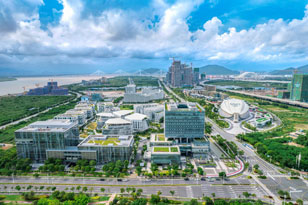What they say
Guangdong boasts a robust atmosphere of technological innovation and provides substantial support for fundamental research, making it one of the most concentrated areas for major scientific infrastructure in the country. The Guangdong Provincial People's Congress has enacted the Guangdong Science and Technology Innovation Regulations, which provide strong support and legal protection for fundamental research efforts. Our collaboration with Guangdong is mainly based on various factors such as regional innovation capacity, requirements for physical research, and policy support.
Li Xiaonan, a deputy to the Guangdong Provincial People's Congress, a researcher at the Institute of High Energy Physics at the Chinese Academy of Sciences
The rapid development of Bronze Technologies is inseparable from Guangdong's excellent industrial ecosystem. Guangdong has cultivated an industry chain cluster around the semiconductor industry … Given the increasingly well-developed industrial foundation, we are more confident in achieving technological innovations and industrial transformation and upgrades. We hope to contribute more to making Guangdong a semiconductor industry hub and advancing high-end manufacturing.
Wang Zhihan, a deputy to the Guangdong Provincial People's Congress and board chairman of Bronze Technologies
Industrial vitalization is of paramount importance. Over the past 18 years of greening barren hills in Lechang, I have had the deep realization that developing a single industry can invigorate the economy of a village, a town, or even an entire county. The most immediate and significant impact of industrial development is job creation. We have established a processing plant for edible camellia oil, providing more than 60 job positions annually. We prioritize hiring local villagers, allowing them to find employment right on their doorstep.
Liao Shixiu, a deputy to the Guangdong Provincial People's Congress and Party secretary of a federation of specialized farming cooperatives in Yunyan township, Lechang, Shaoguan
As the main platform for cultivating high-tech skilled talent, vocational education is thriving alongside the booming manufacturing industry. Guangdong boasts 93 higher vocational institutions, with the student enrollment in these institutions accounting for a significant portion of higher education in the province. Over the past decade, these schools have produced approximately 7.69 million skilled professionals for society. Expanding vocational education abroad to support international production capacity cooperation represents a new driving force for the development of vocational education.
Hua Xuehui, a deputy to the Guangdong Provincial People's Congress, and deputy director of the School of Automotive Engineering at Foshan Polytechnic
To address the public's demand for quality medical services, it is necessary to expand medical resources specifically in the underserved regions of eastern, western and northern Guangdong, as well as in urban grassroots healthcare service institutions. To this end, it is also a must to implement the national program focusing on enhancing grassroots-level medical and healthcare services and facilities. Given the current human resources and infrastructure, an integrated "internet plus healthcare" approach can be used to expand and distribute medical resources, enabling more people to enjoy high-quality medical services without any distance barriers.
Zhang Nu, a deputy to the Guangdong Provincial People's Congress and vice-president of the First Affiliated Hospital of Sun Yat-sen University
High-quality computing network services are crucial for building a world-class bay area. Guangdong is home to two national supercomputer centers in Guangzhou and Shenzhen, and hosts data center clusters in Shaoguan, the Pengcheng Cloud Brain, and the Hengqin Advanced Intelligent Computing Center. With these strong advantages, Guangdong collaborates with Hong Kong and Macao to create a supercomputing application network in the Guangdong-Hong Kong-Macao Greater Bay Area. This ensures high-speed connectivity among the 15 supercomputing subcenters in the region, enhancing computing application benefits and providing a solid digital foundation for the integrated development of the Greater Bay Area.
Lu Yutong, a member of the Guangdong Committee of the Chinese People's Political Consultative Conference, a professor of the School of Computer Science and Engineering at Sun Yatsen University and director of the national supercomputer centers in Guangzhou and Shenzhen
The Guangdong-Hong Kong-Macao Greater Bay Area should explore the development of sports-themed cities tailored to local conditions and establish a window for Chinese sports culture to the world, promoting the construction of a "Sports Bay Area".This joint effort can create a significant platform for dialogue between China and the world through sports and attract global capital, technology and talent by hosting international sports events and activities. This will provide new momentum for high-quality development in the Guangdong-Hong Kong-Macao region. Additionally, building the Sports Bay Area will enhance the overall integration, coordination and endogenous dynamism of the Greater Bay Area's development, offering a valuable Chinese paradigm for establishing a world-class bay area.
Eric Fok Kai-shan, a member of the Standing Committee of the CPPCC Guangdong Committee and deputy director of the Hong Kong, Macao and Taiwan committee of the CPPCC Guangdong Committee



 Print
Print Mail
Mail

